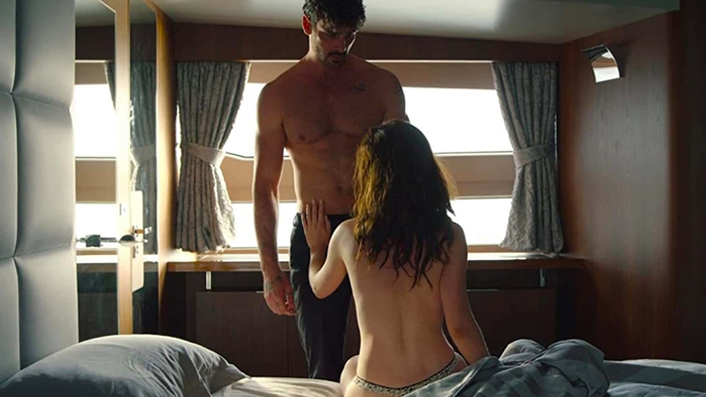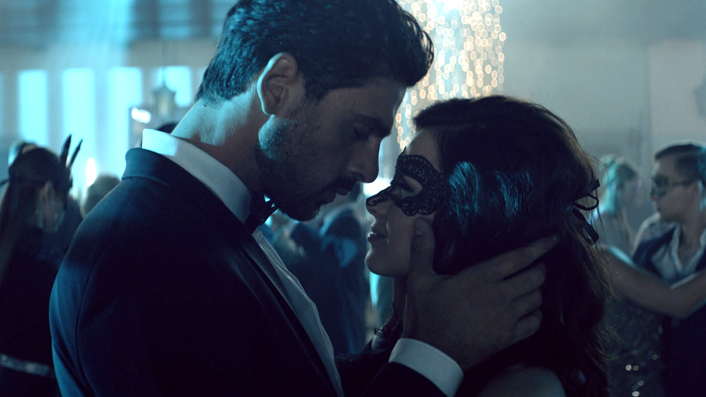In defense of watching (and enjoying) Polish Netflix porno 365 DNI
Untethered from norms like “decency”, “taste” and “good script writing”.

Kiwis have certainly not been immune to the allure of 365 DNI, the salacious Polish pic that’s been in Aotearoa’s ten most-viewed Netflix titles since its release. You may know about some of its most shocking moments, but have you heard Katie Parker’s spirited defense of the film? Read on!
If you haven’t already seen it, you have probably already heard about it: the Polish porn film taking Netflix by storm. Widely dubbed ‘the Polish 50 Shades of Grey’, erotic romance 365 DNI has left the world aghast with its scenes of shockingly explicit sex, blasé attitude towards kidnapping and total disregard for the concept of Stockholm syndrome. It is, to put it lightly, problematic.
See also:
* The best movies and shows coming to Netflix in July
* All new streaming movies & series
Yet no amount of monocles falling from the widened eyes of horrified critics have done anything to stem interest in the film—which, despite earning a big fat zero on Rotten Tomatoes, has been breaking Netflix streaming records internationally since its release on the platform, rocketing to the top 10 in multiple countries. As if we didn’t know already, lots of people like porn, they just don’t like to say that they like porn.

Like 50 Shades, 365 DNI is based on a popular trilogy of books centring on the relationship between a lithe middle-class brunette and a horny but troubled millionaire—but instead of a virginal publishing prodigy and a traumatised tycoon, here the star-crossed lovers are a feisty Polish executive and a psychopathic alpha male Sicilian gangster.
The story begins with Massimo (Michele Morrone), the son and heir to the head of a Sicilian mafia family, watching Laura (Anna-Maria Sieklucka) from afar through a pair of binoculars moments before his father is shot dead. Naturally he becomes obsessed, and spends the next five years searching for her. Finally catching up with Laura as she holidays at a resort for her 29th birthday, Massimo realises it’s time to turn on the charm. So he drugs her, abducts her, holds her captive, and announces she has to live with him in mafia luxury for a year during which time she will presumably fall in love and marry him. What’s not to like?

Sadly, Massimo doesn’t exactly seem like someone you would want to spend a weekend with, let alone a year, however ornate your surroundings might be. He’s brooding. He’s self-serious. He hates jokes so much that if you make one you shouldn’t be surprised if he picks you up by your throat while muttering threats at you, as he does to Laura several times during their enforced courtship. He also warns her that, though he is used to getting everything he wants by force, he will refrain from sex until she gives consent. A gentleman!
Fortunately, Laura is not particularly phased by any of this, and takes the abduction in slightly disgruntled stride and finds it’s not so bad! She goes shopping. He starts to open up. They have weird bickering showers together. Soon she’s finding Massimo’s not so bad and they’re making mad passionate love on the bow of his superyacht, as you do.

If kidnapping and imprisoning seems like an escalation from Christian Grey’s fondness for a bit of old fashioned spanking, that’s not the only way 365 DNI ups the ante, with sex scenes that make 50 Shades’ fraught, softcore BDSM seem quaint. From dildos to cucking to some literally tear inducing fellatio, 365 DNI is shockingly explicit. Rarely are mainstream, simulated sex scenes this full on—and rarer still do they reach such a wide audience.
Critical reactions have, of course, been dripping with disdain. Variety called it a “thoroughly terrible, politically objectionable, occasionally hilarious Polish humpathon”. Buzzfeed labelled it “bizarrely misogynistic”. The Guardian went so far as to envision the disappointment of director Bong Joon-ho, who apparently did not intend for us all to dive headfirst into Polish pornography when he urged the West to embrace foreign cinema.

But it’s not only the porn.
Even Cosmopolitan (the magazine that once suggested their readers use a g-string as a sexy alternative to a scrunchy), found it too abhorrent to even laugh at, the author writing that “I had originally pitched it with the thought that I’d write up a cutesy lil article today about all the best sex scenes. But as much as I wanted to enjoy it, 365 DNI romanticises an extremely toxic relationship, which is never okay.”
Variety meanwhile goes further, arguing that it perpetuates “one of the oldest, falsest and most enraging canards of rape apologism: That it can’t be rape if it seems, after the fact, like she “enjoyed” it.”
These criticisms are entirely valid—and not to state the obvious, but a relationship founded on kidnapping, shopping and the threat of being pushed overboard on a yacht, is never going to be healthy, nor is it something anyone should aspire to.

But the thing is, women know this. In fact, you might find they think about it all the time! I can guarantee that every woman, every day, is aware of the power imbalance often sitting just below the surface of every one of their relationships with men.
In fact, for years now, this fact has been all but inescapable. On and on we read seemingly endless, horrifyingly familiar accounts of women being overpowered by men, not just physically, but professionally, emotionally and creatively, until they are embedded in our consciousness.
And we abhor them. So why is there still such an appetite for entertainment that not only foregrounds unequal power dynamics, but turns them into sexy Beauty and the Beast-esque fairy-tale romances?
No matter how many times we deem it wrong, the story underlying 365 DNI is one that not only keeps resurfacing, but keeps spawning. After all, 50 Shades of Grey was itself conceived as Twilight fan fiction, literally reimagining the fantasy series in the Seattle business world. 365 DNI, with its many narrative, thematic and visual parallels (do people really throw this many masked balls?) is clearly inspired if not directly knocking-off these texts—and with two sequels on the way, seems set to follow the same path to franchise success.

But perhaps it’s because we know how fraught this subject matter is that again and again we keep returning to it. After all what better antidote to fear than desire? What turns us on more than what disgusts us? Is it so hard to imagine that when our fears and our fantasies collide in some trashy mess of a movie, the outcome might be catharsis rather than catastrophe?
Does 365 DNI romanticise kidnapping? Of course it does! In exactly the same way it romanticises wealth, yachts, shopping sprees, the Sicilian mafia, and replicating Victoria Beckham’s asymmetrical bob from 2007.

For me, 365 DNI has nearly everything I am looking for in a movie. Multiple makeover scenes. Endless shopping montages. A cartoonishly absurd, almost Shakespearean subplot involving rival gangs and a mafia war accidentally ignited by Laura’s sexiness.
Even the sex scenes, if not always erotic per se, are nevertheless invigorating in their extremity, an alarmingly thrilling, eye-popping detour from the coy tropes and Girls-esque ‘real’ sex that have become the norm in most Western productions.
Perhaps all of this is really just to say, I don’t think you should feel guilty for enjoying 365 DNI—just as I don’t think you should feel guilty for enjoying 50 Shades of Grey or Twilight or Buffalo 66, or basically any movie for that matter.
The expectation that art (and yes, even the trashiest art) is there to project back to us a politically perfect rendering of the world, with zero moral ambiguity, conflict or tension, is not only unrealistic, it’s not even what people want. In fact, with Hollywood now frantically trying to churn out blandly inoffensive woke froth (Booksmart, I’m looking at you) there is something perversely liberating about a film like 365 DNI.
Untethered from societal norms like “decency”, “taste” and “good script writing”, it imagines a world where our deepest darkest fears are not only realised, but transformed into a love story that eclipses any and all rational thinking. Intellect is overwhelmed and erased by emotion, anxiety becomes arousal, and the only thing to worry about is an off-screen mafia war.
If you really think that 365 DNI poses a genuine threat to women and their understanding of toxic relationships, then that is your prerogative—and hopefully the outpouring of controversy has put you at ease. But maybe, just maybe we deserve a little bit more credit—and after years of being reminded just how horrific our lives can be, maybe we can be allowed some pervy, porny fucked-up fun too.






















